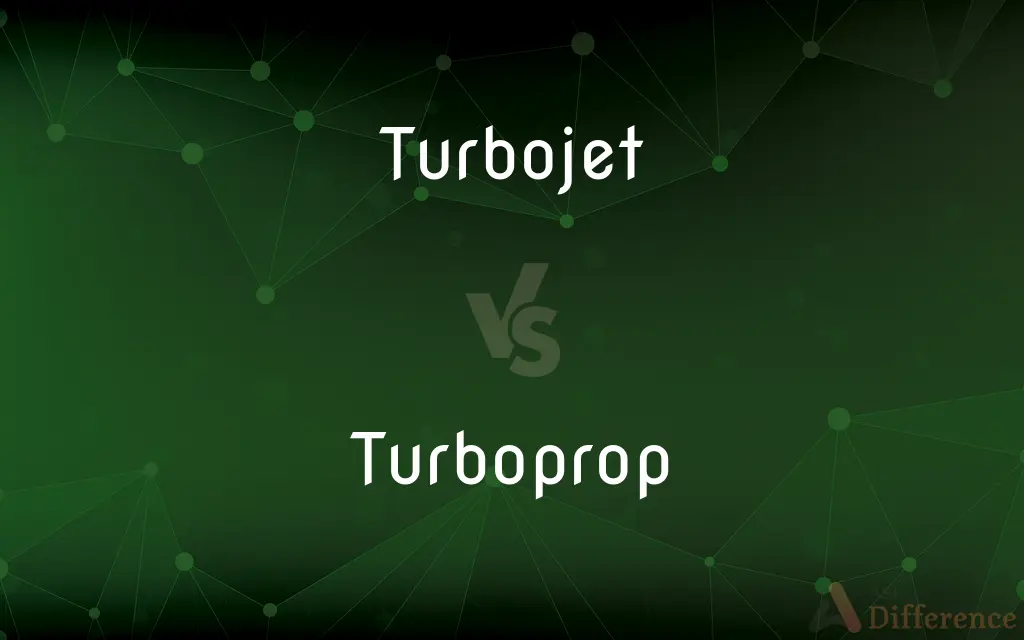Turbojet vs. Turboprop — What's the Difference?
Edited by Tayyaba Rehman — By Fiza Rafique — Updated on September 22, 2023
Turbojet engines rely on jet thrust by expelling exhaust gases, ideal for high speeds and altitudes. Turboprop engines use jet engines to turn a propeller, optimized for lower speeds and fuel efficiency.

Difference Between Turbojet and Turboprop
Table of Contents
ADVERTISEMENT
Key Differences
Turbojet engines generate thrust by accelerating a stream of air through the engine and expelling it at high speeds. Turboprop engines, in contrast, use a jet engine to power a propeller, which provides the thrust.
In a turbojet, the majority of air that flows through the engine is expelled as exhaust, contributing directly to thrust. In a turboprop, most of the energy is used to turn the propeller, making it more efficient at lower speeds.
Turbojets are often used in military jets and commercial airliners that require high speeds and performance at higher altitudes. Turboprops, on the other hand, are commonly found in regional airliners and general aviation due to their efficiency and ability to operate from shorter runways.
Turbojets generally have higher operating costs, especially in terms of fuel consumption. Turboprops are more fuel-efficient and can be more economical for short to medium-haul flights.
While both are types of jet engines, the key difference lies in the mechanism for generating thrust. Turbojets rely solely on jet propulsion, while turboprops utilize both jet propulsion and a propeller.
ADVERTISEMENT
Comparison Chart
Mechanism of Thrust
Jet propulsion only
Jet propulsion and a propeller
Efficiency
Less efficient, higher fuel use
More efficient, lower fuel use
Operating Speed
High speeds
Lower speeds
Typical Usage
Military jets, commercial airliners
Regional airliners, general aviation
Operating Costs
Generally higher
Generally lower
Compare with Definitions
Turbojet
Thrust generated by jet propulsion.
The fighter plane is equipped with a turbojet engine.
Turboprop
Suitable for lower-speed aircraft.
Turboprops are commonly used in general aviation.
Turbojet
Suitable for high-speed aircraft.
Commercial airlines often use turbojet technology.
Turboprop
Thrust generated by a propeller driven by a jet engine.
The regional airplane has a turboprop engine.
Turbojet
Less fuel-efficient than turboprops.
Turbojets are not ideal for short-haul flights.
Turboprop
Commonly found in regional airliners.
Many regional carriers prefer turboprop aircraft.
Turbojet
Used for high-altitude flight.
Turbojet engines excel at high altitudes.
Turboprop
A turboprop engine is a turbine engine that drives an aircraft propeller.A turboprop consists of an intake, reduction gearbox, compressor, combustor, turbine, and a propelling nozzle. Air is drawn into the intake and compressed by the compressor.
Turbojet
Primarily found in military aircraft.
The new military jet uses advanced turbojet engines.
Turboprop
A turbojet engine used to drive an external propeller.
Turbojet
The turbojet is an airbreathing jet engine, typically used in aircraft. It consists of a gas turbine with a propelling nozzle.
Turboprop
An aircraft in which a turboprop is used. Also called propjet.
Turbojet
A jet engine having a turbine-driven compressor and developing thrust from the exhaust of hot gases.
Turboprop
(aeronautics) A type of gas turbine aircraft engine that drives and obtains essentially all thrust from an external (typically unducted) propeller.
Turbojet
Anrcraft in which a turbojet is used.
Turboprop
(aviation) An aircraft that uses a turboprop engine.
Turbojet
(aeronautics) A jet engine that develops thrust solely from high-speed exhaust gases expelled from a turbine that drives a compressor.
Turboprop
Airplane powered by a turbojet engine
Turbojet
Airplane powered by a turbojet engine
Turboprop
An airplane with an external propeller that is driven by a turbojet engine
Turbojet
Jet engine in which a turbine drives air to the burner
Turboprop
More fuel-efficient than turbojets.
Turboprops are ideal for short to medium-haul flights.
Turboprop
Operates effectively at lower altitudes.
Turboprop engines are perfect for island-hopping flights.
Common Curiosities
What is the main difference between a turbojet and a turboprop?
Turbojets use jet propulsion while turboprops use jet engines to turn a propeller.
Are turboprops slower than turbojets?
Generally, yes.
Which is more fuel-efficient?
Turboprops are generally more fuel-efficient.
Which is more costly to operate?
Turbojets usually have higher operating costs.
Which engine is better for higher altitudes?
Turbojets are more suited for high-altitude flight.
What type of flights are turboprops good for?
Short to medium-haul flights.
Can a turbojet operate on a short runway?
Generally, no.
Can a turboprop be converted into a turbojet?
Technically possible but not practical.
Where are turbojets commonly used?
In military jets and commercial airliners.
Do turboprops make more noise?
Generally, yes.
What type of planes commonly use turboprops?
Regional airliners and general aviation planes.
Do turbojets have more parts than turboprops?
Generally no, the complexity depends on design.
Which is older technology, turbojet or turboprop?
Turbojets predate turboprops.
Can a turbojet be used for cargo flights?
Yes, but not ideal for short distances.
Are turbojets more powerful?
They can generate higher speeds, so often yes.
Share Your Discovery

Previous Comparison
Chinged vs. Chinsed
Next Comparison
Plan vs. SetoutAuthor Spotlight
Written by
Fiza RafiqueFiza Rafique is a skilled content writer at AskDifference.com, where she meticulously refines and enhances written pieces. Drawing from her vast editorial expertise, Fiza ensures clarity, accuracy, and precision in every article. Passionate about language, she continually seeks to elevate the quality of content for readers worldwide.
Edited by
Tayyaba RehmanTayyaba Rehman is a distinguished writer, currently serving as a primary contributor to askdifference.com. As a researcher in semantics and etymology, Tayyaba's passion for the complexity of languages and their distinctions has found a perfect home on the platform. Tayyaba delves into the intricacies of language, distinguishing between commonly confused words and phrases, thereby providing clarity for readers worldwide.














































